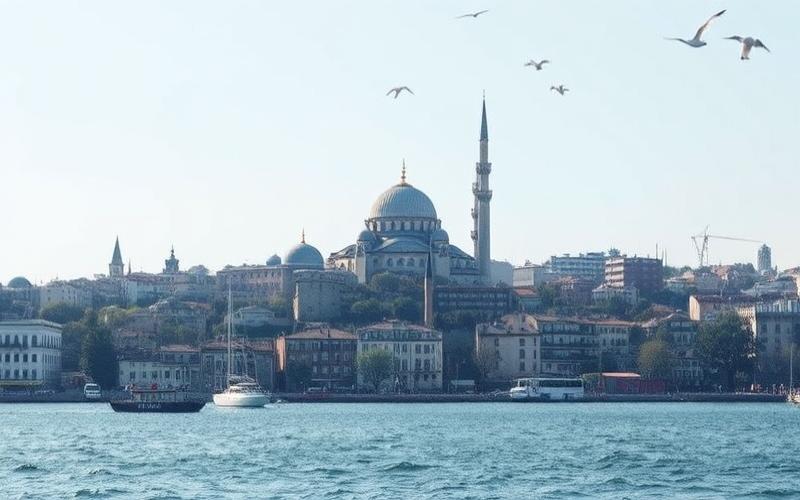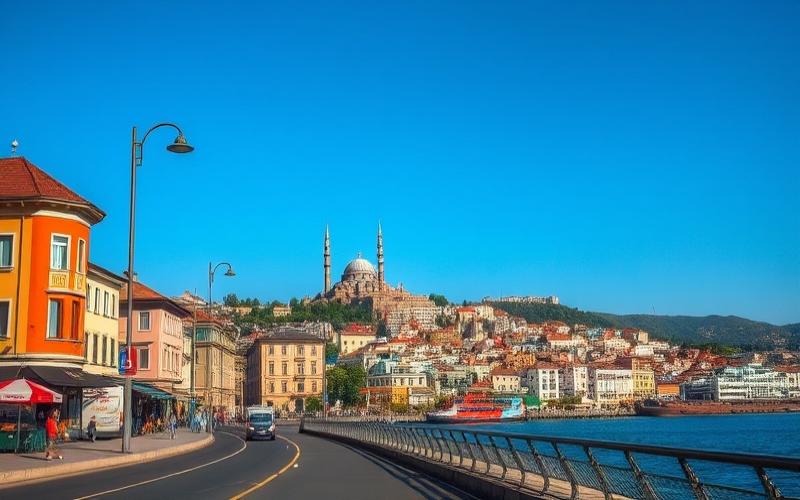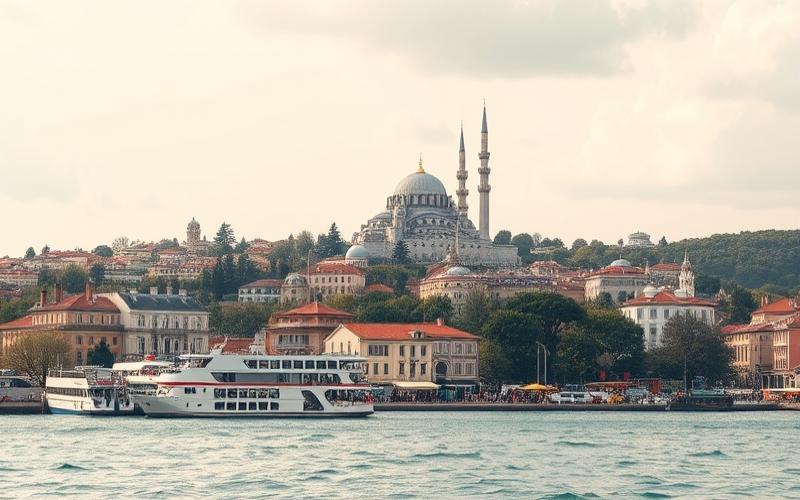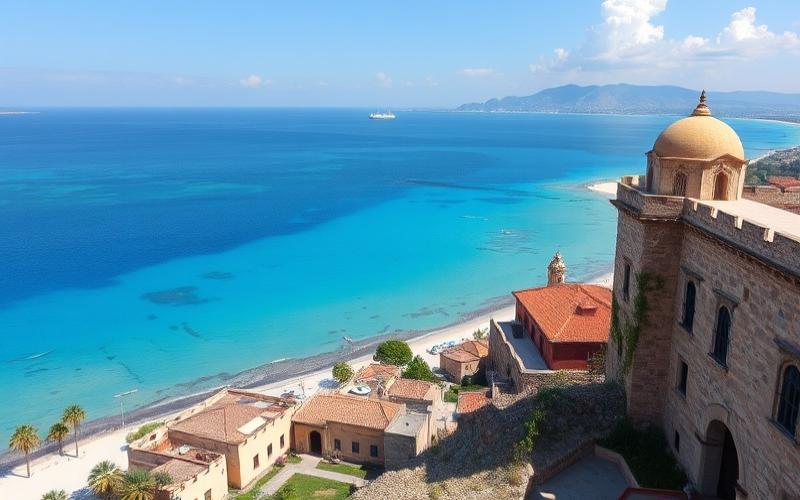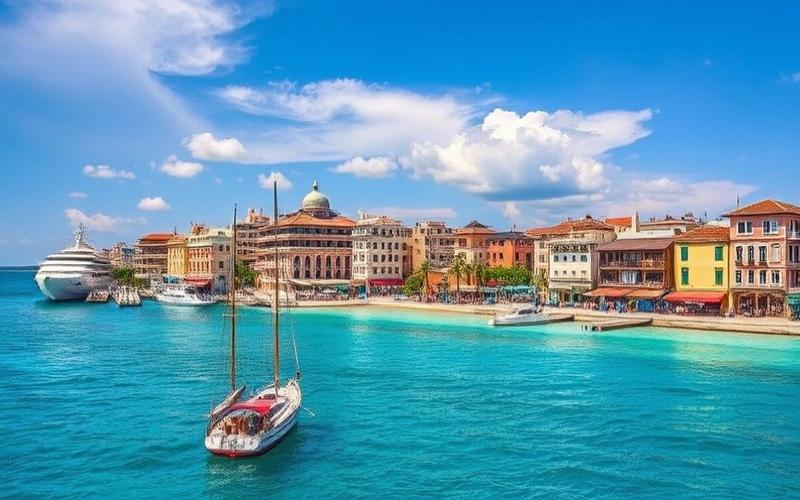
 Published on and written by Cyril Jarnias
Published on and written by Cyril Jarnias
Turkey, a crossroads between East and West, offers a unique experience for expatriates drawn by its rich history and vibrant culture. However, understanding the cost of living is essential for those considering settling in this fascinating country.
Between Istanbul’s colorful markets, Antalya’s sunny beaches, and Cappadocia’s charming villages, the diversity of lifestyles reflects a varied palette of daily expenses. Expatriates must navigate financial nuances, ranging from affordable amenities to upscale residential neighborhoods, to ensure their dream of a new Turkish life is not only exciting but also economically viable.
Understanding the Cost of Living in Turkey: Concrete Examples and Comparisons
Overview of Main Regular Expenses for Expatriates in Turkey
| Category | Turkey (Istanbul) | France (Paris) | Germany (Berlin) | United States (New York) |
| Housing: Rent | $800–1,300/month | $1,200–2,200/month | $1,000–1,800/month | $2,500–4,000/month |
| Food | Meal: ~€8–10 | Meal: ~€15–20 | Meal: ~€12–18 | Meal: ~€20–25 |
| Transportation | Monthly metro pass Istanbulkart: ~$40.50 (€37.50) | Navigo Paris: ~€84.10 | BVG Berlin: ~€86 | MetroCard NYC: ~$127 |
| Healthcare | Private GP consultation: €25-40 Annual private health insurance for expats: from €500/year Public hospital generally free for residents Medications cheaper than in Europe |
The cost of living in Turkey is approximately 36% lower than in France. Rent and subscriptions are significantly more affordable; a one-bedroom apartment in central Istanbul averages between $800 and $1,300/month, whereas in Paris or New York, prices are more than double.
Concrete Price Examples
- City center apartment rent in Istanbul:
- One bedroom: €900/month
- Three bedrooms: $1,652/month
- Budget restaurant:
- Typical lunch/dinner menu in Istanbul or Izmir:
- €8 to €10
- Typical lunch/dinner menu in Istanbul or Izmir:
- Gasoline:
- €1.1/L
- Monthly public transportation pass:
- IstanbulKart main metro: ~$40
Factors Influencing Cost of Living Fluctuations
- Inflation: Turkey has experienced high inflation in recent years, strongly impacting the price of imported and local food products.
- Exchange Rate: Fluctuations between the Turkish lira (TRY), euro (€), dollar ($), etc., directly affect the budget of expatriates paid in or holding foreign savings.
- Political and Economic Situation: Political changes can influence access to private healthcare or certain imported products.
Practical Tips for Effectively Managing Your Budget in Turkey
Adopt these simple strategies to optimize your daily expenses:
- Prefer local products at markets over international supermarkets
- Regularly compare exchange rates if transferring funds from your home country
- Choose housing outside the city center to significantly reduce your monthly budget
- Use the Istanbulkart or regional equivalent to benefit from preferential rates on all types of urban transport
- Subscribe to a local health insurance plan tailored to actual needs
Regional Differences – Impact by City
Costs vary strongly by region:
| City | 1-Bedroom Rent City Center/Month (€) |
| Istanbul | ~900 |
| Ankara | ~570 |
| Izmir | ~590 |
Outside major tourist cities like Antalya, Bodrum, or Marmaris, it’s possible to access a comfortable standard of living with an even more moderate budget. However, coastal resorts remain popular with some expatriates due to the low cost of local food and pleasant climate year-round.
To master your budget in Turkey while fully enjoying the country, it’s therefore essential first to anticipate your main expenses based on your city of residence and preferred lifestyle.
Good to Know:
In Turkey, expatriates must plan their budget considering main expenses such as housing, food, transportation, and healthcare. In Istanbul, a one-bedroom apartment in the city center costs about 450 euros per month, significantly less than in Paris or Berlin, where similar prices are around 1,300 and 900 euros respectively. Food costs are also lower, with a restaurant meal costing about 5 euros, compared to 15 euros in France. Public transport is affordable, with a monthly pass in Istanbul amounting to 30 euros, versus over 75 euros in New York. However, it’s essential to monitor inflation and exchange rate fluctuations that can affect these costs. To save, it’s advisable to choose housing in the suburbs where rents are lower and buy local products to avoid high import margins. Comparatively, Ankara and Izmir offer more economical living conditions than Istanbul, which can be financially advantageous for budget-conscious expatriates.
Assessing an Expatriate’s Budget in Turkey: What to Expect
| Expense Category | Istanbul (Major City) | Secondary Cities (e.g., Antalya, Izmir) | Tips & Tricks |
|---|---|---|---|
| Housing (1 bedroom, city center) | 30,000 – 32,000 TL/month | 19,000 – 22,000 TL/month | Renting outside the city center or in emerging neighborhoods significantly reduces cost. Prefer shared housing to save more. |
| Housing (3 bedrooms, city center) | ~56,500 TL/month | ~30,000 – 36,000 TL/month | Negotiate rents at renewal time or search through local/expatriate networks. |
| Real Estate Purchase | More expensive in Istanbul | Cheaper in less urbanized regions | Buying off-season and targeting new developing areas can offer better investment opportunities. |
| Utilities (electricity, water, gas) | Approximately 1,950-2,300 TL/month | Similar | Prefer energy-efficient appliances and monitor water/gas consumption. |
| High-Speed Internet | ~400-600 TL/month | Slightly less | |
| Local Food | Monthly groceries: ~8,500-12,500 TL | Up to -20% depending on region |
Local markets: affordable fruits/vegetables
Supermarkets/imports: higher prices
Budget restaurant meal: 350-400 TL
Standard restaurant meal: 800-1000+ TL
Shopping at local markets provides access to fresh and cheap products; limit buying imported goods which remain expensive.
Indicative list:
– Local bread (~10 TL), vegetables (~40–60 TL/kg), local meat (~250–350 TL/kg)
– Imported products up to +50% more expensive
Transportation
- Public transport pass Istanbul: approximately 1,400 TL/month
- Other medium-sized cities: 300–600 TL/month
- Private car gasoline: ~44–46 TL/liter, meaning a high fuel budget for daily use.
Opting for public transport remains much more economical than a personal car.
Taxis are affordable but cumulative over the long term.
Tips:
Prefer monthly cards or passes for bus/metro/tram.
Use shared services/collective taxis (“dolmuş”) outside peak hours.
Healthcare
International health insurance recommended: rates vary by age/coverage but expect ~€2,500–5,000 per year.
Simple private medical consultation: about 800–1500 TL.
Public hospitals accessible but sometimes long wait times; private ones efficient but more costly without insurance.
Tips:
Compare insurance offers before departure,
Subscribe to a local complementary plan for long stays (>6 months).
Education
International school Istanbul/year/child: 485,230 TL
Antalya/Izmir/year/child: between 200,000 –360,000 TL
Public schools free but teaching only in Turkish.
Prefer international schools if not proficient in Turkish.
Entertainment & Leisure
Cinema/individual ticket ≃120—180 TL,
Gym ≃750—1200 TL/month,
Outings/restaurants/bars significantly cheaper than in Western Europe,
Streaming/internet subscriptions similar to European prices.
Tips:
Take advantage of local or student offers;
Discover free activities like museums on certain days, municipal cultural events;
Regional Differences
Overall cost is up to +25% in Istanbul compared to the national average;
Popular coastal cities are also relatively expensive on some tourist items;
Daily life remains noticeably less costly in inner Anatolia and some medium-sized cities where housing/food/services are much cheaper;
Practical Tips to Optimize Your Budget
- Renting furnished avoids significant initial expenses
- Prefer annual/semester payment with negotiated discount for significant rents
- Do most shopping at traditional markets (“pazar”)
- Use local mobile apps to compare food/transport/medical service prices
To live comfortably alone in Istanbul with a moderate European lifestyle, plan a total budget around 24,000 –27,500 TL per month (excluding international school); this amount often drops below 18,000 TL in a secondary city — excluding exceptional expenses or a “premium” lifestyle.
Budget-conscious expatriates prefer public transport, local purchases, and peripheral residential neighborhoods while fully enjoying Turkish cultural dynamism.
Good to Know:
When assessing an expatriate’s budget in Turkey, it’s essential to anticipate main expense categories such as housing, where rents in Istanbul can be much higher than in less urbanized cities. Real estate is relatively affordable, but prices vary considerably by region. Utility costs like electricity, water, and gas are generally reasonable but can add up. Local food is affordable, while imported products are often more expensive. Public transport, economical and extensive, is a viable option, even though a private vehicle involves higher fuel costs. Healthcare expenses include private health insurance often necessary for better access to care. Spending on entertainment, leisure, and education (for children, especially in international institutions) must also be considered. Regional differences are significant, particularly in daily expenses, and it’s advisable to research costs in your city of residence. To save, prioritize local markets for groceries, opt for public transport passes, and explore free or low-cost activities.
Daily Life in Turkey: Tips for Saving Money
Daily life in Turkey offers many opportunities to optimize your budget while enjoying appreciable comfort.
Tips for Saving Daily:
- Prefer local markets (pazar) to buy fruits, vegetables, and fresh products at very competitive prices. Producers sell directly there, allowing you to get seasonal products at lower cost.
- Use public transport, especially the metro in big cities and dolmuş (shared minibuses), which offer an economical alternative to taxis or personal cars.
- Choose housing in less touristy neighborhoods, where rent and dining prices are significantly lower than in central areas or those popular with foreign visitors.
- Get used to negotiating prices in bazaars and markets: bargaining is an integral part of Turkish commercial culture, often allowing substantial discounts on the initial price.
- Regularly monitor promotions and discounts in national supermarkets (Migros, BIM, Şok). Many offer special weekly deals on food or hygiene products.
| Tip | Main Advantage | Where to Apply? |
|---|---|---|
| Local markets | Fresh products & low prices | All neighborhoods |
| Dolmuş & metro | Reduced travel costs | Major cities |
| Non-touristy neighborhoods | Affordable rent | Urban periphery |
| Bazaar negotiation | Frequent discounts | Bazaars, markets |
| Supermarket promotions | Savings on regular purchases | National chains |
Expatriate Testimony Examples:
- “We chose a slightly outlying residential neighborhood in Istanbul: our rent is half that of city center ones. The local market allows us to buy our fruits and vegetables each week for three times less than in supermarkets.”
- “The dolmuş is ideal for getting around without blowing your transport budget. I also use the Istanbulkart to benefit from preferential metro rates – very practical if you work in the city!”
- “For eating out, we always avoid places too crowded by tourists: sometimes walking ten minutes from a main attraction is enough to find a family restaurant where the meal costs half as much. We also watch all Migros promotions via their mobile app – it really makes a difference on the monthly food budget!”
Additional Tips:
- Prefer cooking yourself with products bought at the market rather than frequenting restaurants or prepared meals
- Buy clothes outside international malls; prefer local shops or discount stores
- Track expenses using Turkish mobile banking apps that automatically categorize each transaction
Combining these tips truly allows comfortable living in Turkey while controlling your monthly budget.
Good to Know:
To save in Turkey, prioritize buying fresh products at local markets often cheaper than supermarkets; expatriates attest to the freshness and unbeatable prices of fruits and vegetables. Use dolmuş, shared minibuses, for economical city travel and avoid tourist areas for housing and dining, where prices can be significantly lower. Negotiating in bazaars is common and allows for better prices, while staying attentive to promotions and discounts in supermarkets can considerably lighten your budget. Expatriates confirm that living in local non-touristy neighborhoods helps maintain an affordable cost of living while enjoying an authentic and comfortable experience in Turkey.
Housing, Transport, and Food: Breakdown of Main Expenses
Comparison of average monthly rent prices (2025) in popular cities:
| City | Studio/1+1 Apt. Center | Studio/1+1 Apt. Periphery | 3+1 Apt. Center |
|---|---|---|---|
| Istanbul | 15,000–20,000 TRY | 10,000–15,000 TRY | >30,000 TRY |
| Ankara | ~8,000 TRY | contact me for a free initial consultation and let’s envision your new adventure together! |
Disclaimer: The information provided on this website is for informational purposes only and does not constitute financial, legal, or professional advice. We encourage you to consult qualified experts before making any investment, real estate, or expatriation decisions. Although we strive to maintain up-to-date and accurate information, we do not guarantee the completeness, accuracy, or timeliness of the proposed content. As investment and expatriation involve risks, we disclaim any liability for potential losses or damages arising from the use of this site. Your use of this site confirms your acceptance of these terms and your understanding of the associated risks.











